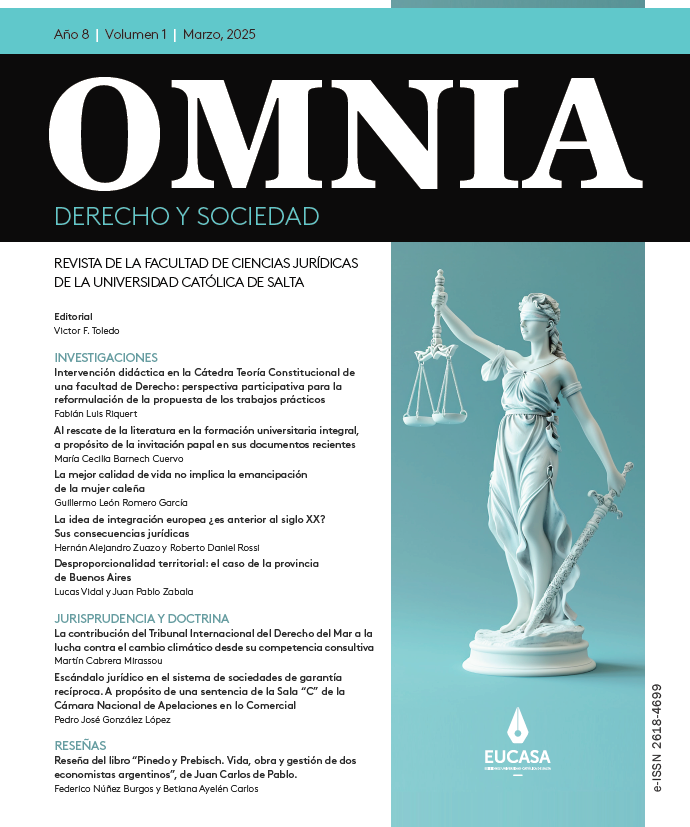Un An independent judiciary, does it contribute to strengthening peace in the region?
A view from the Court of Justice of the European Union.
Abstract
The aim of this paper is to clarify whether, in order to contribute to preserving peace in the European Union (EU), which is a legal construct governed by the rule of law (compliance with the law), it is important to have an independent judiciary.
Thus, in developing this research, we defined the type of peace the EU seeks (positive and negative peace), established the meaning of the concept of the rule of law —compliance with the law—, and explained the idea of judicial independence, whose fundamental characteristics arise from the jurisprudence of the Court of Justice of the European Union and are applicable to all European judges, so that their functions can be carried out with complete freedom; that is, without being influenced by pressure from other branches of government or from different types of corporations, including economic, union, professional, or from the internal structures of the judiciary itself.
Therefore, we conclude that without independent judges who can enforce the law in the region, it is very difficult to preserve peace in a community characterized by its cultural, social, economic, legal, and political heterogeneity, among others.
Downloads
References
.
Referencias bibliográficas
Arenas García, R. (2020). El Estado de derecho en la UE: significado, desafíos y perspectivas de futuro. https://revistascientificas.us.es/index.php/araucaria/article/view/13488/11608)
Barrio López, A. (2022, enero-junio). Democracia iliberal, populismo y Estado de derecho. Estudios de Deusto. Revista de Derecho Público, 70(1) https://doi.org/10.18543/ed7012022
Comisión Europea para la Democracia por el Derecho (Comisión de Venecia) (2010, marzo 16). Estudio número 494/2008. Informe sobre la independencia del sistema judicial Parte I: La independencia de los jueces.
Comisión de Venecia. (2011, marzo). Reporte sobre el Estado de derecho. https://www.venice.coe.int/webforms/documents/?pdf=CDL-AD(2011)003rev-spa
Consejo Europeo de Copenhague de 1993.
Courtis, C. (2006). Ni un paso atrás. La prohibición de regresividad en materia de derechos sociales. Editores del Puerto.
Dąbrowski, M. (2023). The judgment of the Constitutional Tribunal of 7th October 2021, K 3/21. The case study on declaring the unconstitutionality of UE Treaties. European Studies, 10(2), 271-280. https://doi.org/10.2478/eustu-2023-0021, https://sciendo.com/article/10.2478/eustu-2023-0021
Gliszczyńska-Grabias A. y Sadurski W. (2023). Is It Polexit Yet? Comment on Case K 3/21 of 7th October 2021 by the Constitutional Tribunal of Poland. European Constitutional Law Review, 19(1), 163-181. https://doi.org/10.1017/S1574019622000396, https://www.cambridge.org/core/journals/european-constitutional-law-review/article/is-it-polexit-yet-comment-on-case-k-321-of-7-october-2021-by-the-constitutional-tribunal-of-poland/77AF66DC05D5DCDA427074562C834E81
Granillo Ocampo, R. (2007). Derecho Público de la Integración. Ed. Abaco de Rodolfo Depalma.
Kahn, S. (2023). Historia de la construcción de europea después de 1945. Editorial El Ateneo.
Klein Vieira, L. (2011). Interpretación y aplicación uniforme del derecho de la integración. Editorial BdeF.
Krzywon, A. (2020). La defensa y el desarrollo del principio de independencia judicial en la Unión Europea 2020. Revista Española de Derecho Constitucional, 119, 85-117. https://www.cepc.gob.es/sites/default/files/2021-12/39099redc11903krzywon.pdf
Lenaerts, K. (2019). La Unión Europea como un ordenamiento basado en el Derecho que contribuye a la paz y a la estabilidad internacional. Tribunal Constitucional de España. https://www.tribunalconstitucional.es/ActividadesDocumentos/2019-10-25-00-10/La%20Uni%C3%B3n%20Europea%20como%20un%20ordenamiento%20basado%20en%20el%20Derecho%20que%20contribuye%20a%20la%20paz%20y%20la%20estabilidad%20internacional.pdf
Martín Rodríguez, P. J. (2018). El Estado de derecho y el sistema jurídico de la Unión Europea. https://www.upf.edu/documents/6764143/93632110/Cap%C3%ADtulo_Pablo_Mart%C3%ADn.docx.crdownload.pdf/14dbd5f4-4b00-01d6-119c-5c25f97bb95f
Moliterno J. y Curos P. (2022). Ataques recientes a la independencia judicial: lo vulgar, lo sistemático y lo insidioso. Teoría y realidad constitucional (50), 117-164. https://revistas.uned.es/index.php/TRC/article/view/36370/26969
Oteiza, E. (2019). El deber de respetar la independencia judicial. Esfuerzos y ambigüedades de los Estados en el plano internacional. En Oteiza E. y Fenoll Nieva J. (Dirs.), En la independencia judicial: un constante asedio. Editorial Marcial Pons.
Pérez Sauceda, J. B. (2015, enero-junio). Cultura de paz y resolución de conflictos: la importancia de la mediación en la construcción de un Estado de Paz. Ra ximhai, 11(1), 109-131, Universidad Autónoma Indígena de México. https://www.realyc.org/artículo.oa.id:46139401006.
Ramírez Escudero, D. S. y Orts, E. A. (2022, diciembre 28). La independencia judicial en la jurisprudencia del Tribunal de Justicia de la Unión Europea. Repositorio Español de Ciencia y Tecnología (RECYT) n.° 198. https://www.cepc.gob.es/publicaciones/revistas/revista-de-estudios-politicos/numero-198-octubrediciembre-2022/la-independencia-judicial-en-la-jurisprudencia-del-tribunal-de-justicia-de-la-union-europea
Taruffo, M. (2019). Consideraciones generales sobre la independencia de los jueces. En Oteiza E. y Fenoll Nieva J. (Dirs.), En la Independencia judicial: un constante asedio. Editorial Marcial Pons.
Tratado Constitutivo de la Comunidad Europea del Carbón y del Acero, Preámbulo pp. 5-6, Biblioteca Virtual Miguel de Cervantes. https://www.cervantesvirtual.com/obra/texto-del-tratado-constitutivo-de-la-comunidad-europea-del-carbon-y-del-acero-1144787/
Zuazo, H. A. y Rossi, R. D. (2025). La Idea de la Integración Europea, ¿es anterior al siglo XX? Revista Omnia, 8(1), 67-88. https://doi.org/10.53794/ro.v8i1.617. https://revistas.ucasal.edu.ar/index.php/RO/article/view/617/639
Jurisprudencia
Tribunal Europeo de Derechos Humanos (TEDH). “Campbell y Fell c. Reino Unido”, serie A n.° 80, 28/6/1984. https://hudoc.echr.coe.int/eng{%22languageisocode%22[%22SPA%22],%22appno%2:[%227819/77%22,%227878/77%22],%22documentcollectionid2%22[%22CHAMBER%22],%22itemid%22:[%22001-165118%22]}
Tribunal de Justicia de la Unión Europea (TJUE). “Abrahamsson y Anderson”, C-407/98, 6/7/2000. https://eur-lex.europa.eu/legal-content/ES/TXT/PDF/?uri=CELEX:61998CJ0407 .
TJUE. “AK”, C-585/18, 19/11/2019https://curia.europa.eu/juris/document/document.jsf;jsessionid=C2ABECDD4B5E671F1EC5EC09388DDCAEtext=&docid=220770&pageIndex=0&doclang=ES&mode=lst&dir=&occ=first&part=1&cid=517236
TJUE. “Associação Sindical dos Juizes Portugueses y Tribunal de Contas”, C-64/16, 27/2/2018.https:// eur-lex.europa.eu/legal-content/ES/TXT/PDF/?uri=CELEX:62016CJ0064
TJUE. “Banco Santander”, C-274/14, 21/1/20. https:// eur-lex.europa.eu/legal-content/ES/TXT/PDF/?uri=CELEX:62014CJ0274
TJUE. “Comisión/Reino Unido”, C-584/10, 18/7/2013. https://https://eur-lex.europa.eu/legal-content/EN/ALL/?uri=CELEX:62010CJ0584
TJUE. “Consorci Sanitari del Meresme”, C-203/14, 6/10/2014. https://curia.europa.eu/juris/document/document.jsftext=&docid=169181&pageIndex=0&doclang=ES&mode=lst&dir=&occ=first&part=1&cid=540659
TJUE. “Hungría vs. Eslovaquia”, C-364/10, 8/7/2010. https://eur-lex.europa.eu/legal-content/ES/TXT/PDF/?uri=CELEX:62010CJ0364
TJUE. “Kadi”, C-402/5, 3/9/2008. https://https://eur-lex.europa.eu/legal-content/EN/TXT/?uri=CELEX:62005CJ0402
TJUE. “Los verdes”, C-294/83, 23/4/1986. https://eur-lex.europa.eu/legal-content/ES/TXT/PDF/?uri=CELEX:61983CJ0294
TJUE. “Margarit Panicello”, C-503/15, 16/2/2017. https://curia.europa.eu/juris/document/document.jsftext=&docid=187918&pageIndex=0&doclang=ES&mode=lst&dir=&occ=first&part=1&cid=544172#Footnote*
TJUE. “Mt. Hojgaard y Zublin”, C-396/14, 24/5/16. https://eur-lex.europa.eu/legal-content/ES/TXT/PDF/?uri=CELEX:62014CJ0396
TJUE. “Repubblikka”, C-896/19 (opinión del Abogado General), 17/12/20. https://curia.europa.eu/juris/document/document.jsftext=&docid=235729&pageIndex=0&doclang=ES&mode=req&dir=&occ=first&part=1&cid=561483
TJUE. “Repubblikka”, C-896/19, 20/4/2021. https://eur-lex.europa.eu/legal-content/ES/TXT/PDF/?uri=CELEX:62019CJ0896
TJUE. “R. Polonia/Comisión”, C-335/9, 26/6/2012. https://curia.europa.eu/juris/document/document.jsftext=&docid=124382&pageIndex=0&doclang=ES&mode=lst&dir=&occ=first&part=1&cid=548669
TJUE. “TDC”, C-222/13, 9/10/2014. https://curia.europa.eu/juris/document/document.jsftext=&docid=158428&pageIndex=0&doclang=ES&mode=lst&dir=&occ=first&part=1&cid=552786
TJUE. “Vaassen Goebbels”, C-61/65, 30/6/1966. https://eur-lex.europa.eu/legal-content/ES/TXT/PDF/?uri=CELEX:61965CJ0061
TJUE. “Wilson”, C-506/04, 19/9/06. https://curia.europa.eu/juris/document/document.jsftext=&docid=64426&pageIndex=0&doclang=ES&mode=lst&dir=&occ=first&part=1&cid=556714
Copyright (c) 2025 Roberto Daniel Rossi, Hernan Alejandro Zuazo

This work is licensed under a Creative Commons Attribution-NonCommercial-ShareAlike 4.0 International License.








